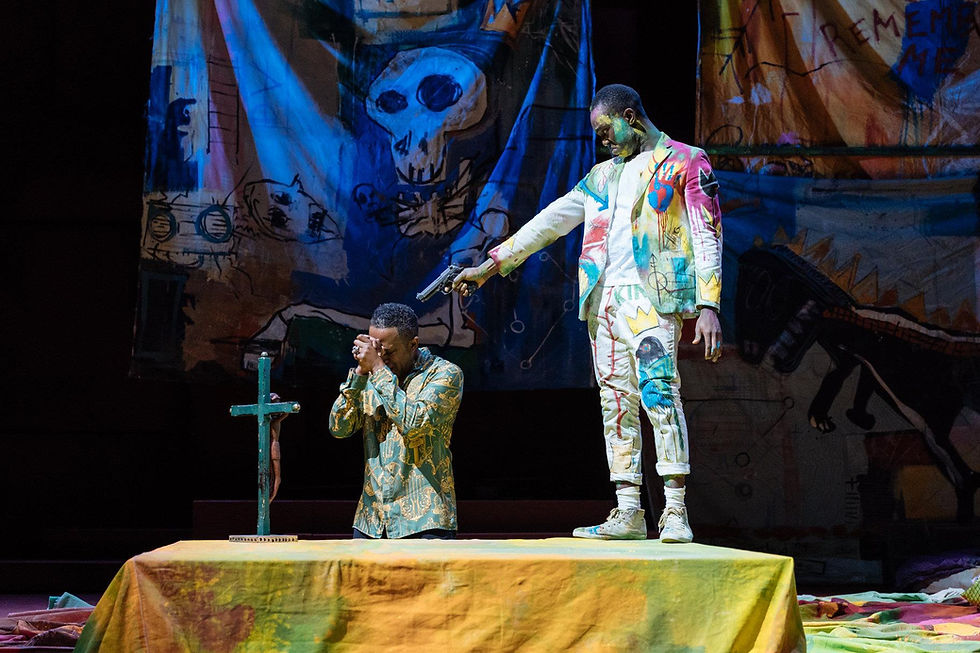Simple but Effective: The Globe’s ‘The Tempest’
- Becky Golding

- Aug 10, 2020
- 3 min read
Now that the ‘National Theatre at Home’ series has come to an end, I’ve been looking for a way to fill the theatrical void. Luckily for me, the BBC has come through and delivered! Thanks to their ‘Culture in Quarantine: Shakespeare’ series, eight performances of Shakespeare’s best-loved plays are available on iPlayer to watch for up to a month. This review is on The Globe’s 2013 production of The Tempest, directed by Jeremy Herrin (apologies if you’re fed up with all of the Shakespeare content! For context, I’m studying a Shakespeare module during my final year of university and am staying inside as much as possible so I don’t have the opportunity to visit a physical theatre at this moment).
One of the real selling points of this adaptation is that Roger Allam (Endeavor, The Thick of It) stars as a thoroughly likeable Prospero. Allam is made for the role. Aside from looking the part, he is thoroughly at ease with Shakespearean English and weighs every word perfectly. Allam delivers powerful soliloquies and offsets his vengeful wrath with his good-natured (albeit possessive) concern for his adored Miranda (Jessie Buckley). This performance places great emphasis on the affable bond between father and daughter. The two share a tender embrace when Prospero recounts to Miranda how they came to be stranded on the island. Moreover, it is clear that Caliban’s lustful desire for the young teenage girl has inspired Prospero’s redoubled vigilance. He eavesdrops on the first amorous encounter between Miranda and Ferdinand by lying prostrate on an upper platform and maintains a cold aloofness around Ferdinand during their later interactions. He even forces the feeble, pretty boy prince to perform manual labour to prove himself. Prospero’s emphatic declaration that pre-marital sex is entirely off-limits for the pair is met with a fervent scowl from Miranda and a hearty laugh from the audience. Even during the wedding dance, Prospero is desperate to maintain control by repeatedly partnering his daughter, much to the audience’s amusement.

Another somewhat surprising standout performance is given by Joshua James as Ferdinand. He plays a suitably naïve, doting, and (dare I say it) slightly pathetic love interest. Always one to make a mountain out of a molehill, the puny prince painstakingly gathers firewood as a romantic gesture for Miranda, only for her to lift the heavy logs with much greater efficiency and ease. The pair is very believable as an infatuated couple and have an undeniable magnetism.

Sam Cox as the sloshed butler Stephano and Trevor Fox as the Geordie jester Trinculo (complete with curly cod-piece!) are responsible for much of the remainder of the play’s hilarity. The pair haphazardly stumble across the stage during their inebriated exchanges, roaring drunk on Stephano’s homemade booze which they regularly shower onto audience members standing in the pit.

Colin Morgan (Merlin) plays an impressively acrobatic and ethereal Ariel. Director Jeremy Herrin ensures that his character makes full use of the very simple staging, as he scales walls, swings from the overhead platform, and light-footedly leaps from place to place. Audience members are likely to pity him as he tenderly asks Prospero whether he can be released. Globe regular James Garnon plays a waddling, monkey-like Caliban who unashamedly burps and spits in the groundlings’ faces. The smattering of bloody gashes and sores on his body gesture towards Prospero’s cruelty, coupled with the red and white body paint (the same colour as the island’s rocks and pillars) which helps to subtly underline the themes of colonialism and displacement. Garnon does well to balance out Caliban’s bitter desire to avenge Prospero with his potent fear of the powerful sorcerer. His Caliban is comfortable hurling abuse at Prospero from afar but whimpers and cowers in the face of any real danger. Although Garnon is a capable Caliban, I felt he never realised the character’s full potential. His character didn’t elicit enough sympathy or hatred from the audience in my opinion, and he was outshined in comic scenes featuring Stephano and Trinculo.
As previously mentioned, the staging for this performance was fairly minimalistic, comprising of a staircase, a raised platform, wooden walls, and red and white boulders – nothing to write home about but simple enough to enable the actors to seize all the limelight. Magic is created through simple means – acrobatic leaps, flourishes of a wooden staff, and showers of confetti. However, there are occasional glimpses of the regular ‘Globe pizzazz,’ such as the use of skeletal puppets and ornate, ostentatious headpieces.

My only real complaints are that the King of Naples and his posse didn’t feel well-defined. They gave decent performances but nothing to really capture the audience’s interest. In addition, I felt that more could have been done to emphasise that Prospero’s status as an accomplished scholar. Moreover, I felt that Allam’s Prospero was potentially too likeable as the audience was given no real glimpses of his former selfishness and inadequacy as a father.
4/5 stars.



コメント